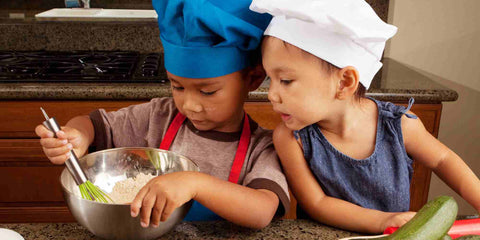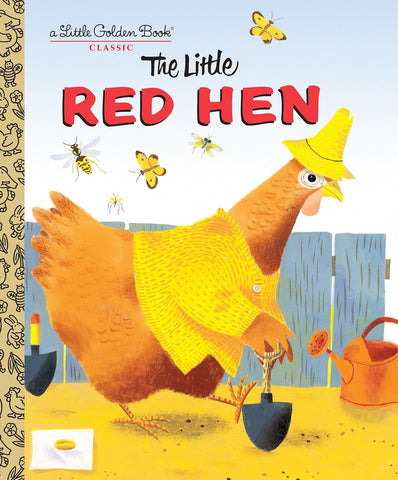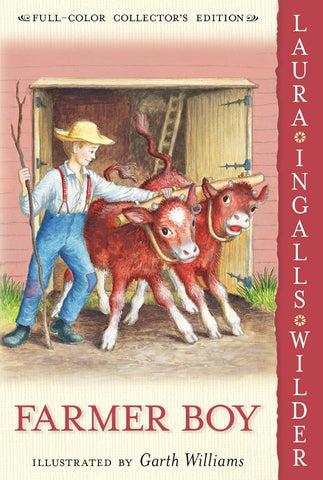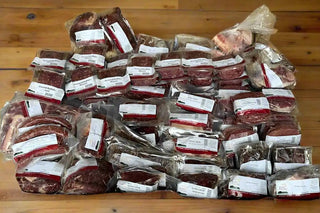Top 6 Teachable Moments in Cooking with Kids
Finding a healthy relationship with food is so important - especially for kids who are still learning to navigate the world. It teaches us how to experiment (“What happens if I add cayenne pepper to this cake recipe?”), how to deal with the consequences of our own actions (“This cake is TOO SPICY!”), and how to problem solve (“I won’t add cayenne pepper next time.”). Learning how to cook is integral to eventually becoming an independent and healthy adult, but all the little building blocks that make up the big picture of cooking - learning how to read a recipe, use fractions, measure, safely use tools, etc. - are applicable in so many ways throughout life.

Here, we have compiled our list of 6 tips for cooking with kids. As always, let your gut take the lead - you know your kid better than anyone, so do what feels best for your family. But the one rule we insist on - make it fun!
- Break down a recipe into smaller tasks - Making even something as simple as a smoothie can be overwhelming if you are not used to being in the kitchen. It can also be…very messy! So, an easy way to start is to break down the recipe even further, especially for kiddos that like to take things literally.. An example would be - the first step of making a smoothie is to make sure we have all the ingredients. Then, we take out the measuring cups. After that, we find the correct measuring cups we need and place them on the counter. Then, we use the measuring cups to measure the fruit into a bowl. Then, we dump the bowl into the blender. And so on.
- Clean as you go - Still one of the most important life lessons I’ve learned to date! Incorporate cleaning into each step of the recipe. If you can, write it down on the recipe so it becomes part of the process. After a while, it will become second nature, and your kitchen will no longer look like a crime scene (unless you’re cooking beets).
- Create a safe environment - Safety is always first! No one will enjoy cooking if they get burned on a hot oven, slice a finger open, or contract salmonella. Start small, with hand washing, and work up to correct usage of tools like blenders. Starting with age-appropriate safe kitchen tools can help, like child-size plastic knives to learn cutting skills, or a an old-school hand-held egg beater for slow and controlled mixing.
- Encourage creativity - The kitchen can be a place for experimentation! Trying new things is always a learning experience, even if they go poorly. Sometimes, learning from our own mistakes is even more memorable than doing something right the first time. If you are worried about messing up, say, a whole batch of cupcakes for the bake sale, then separate the batter into two batches, and let your kiddo flavor or decorate one with their own ideas. This way, they can compare and contrast the two batches and figure out the difference. Plus, it’s always good to have a nice tasting back-up batch to snack on if their experiment goes awry!
- Connect with the food - It’s easy to learn that food just comes from the grocery store. What is more difficult, but so important, is to learn how food is made. Visit a farm, milk a cow, harvest some freshly-laid eggs if possible - all these activities contribute to your kid making the connection between what is on our plates to our environment and our community. That connection fosters a deep & thoughtful relationship to what we eat.
- Patience is key - Messes will happen. Accidents will happen. Disgusting food will happen, which you will then have to taste. It’s all part of the learning process! Accept it for what it is, and use the clean up afterwards as a teachable moment.
YFM Book Corner
Our favorite recommendations for books to connect your kiddos to food, cooking, and agriculture:
Pancakes, Pancakes by Eric Carle - a delightful book for younger readers about the whole process of making a favorite food - pancakes!
The Little Red Hen - a classic tale about helping hands and the work it takes to grow and cook food.
Farmer Boy by Laura Ingalls Wilder - a great read for older kids, all about growing up on a farm and growing your own food and necessities.






